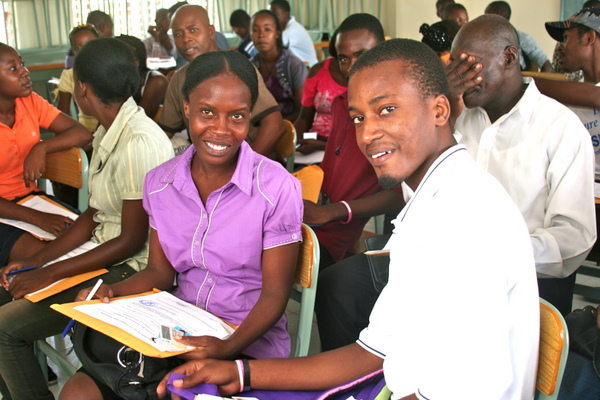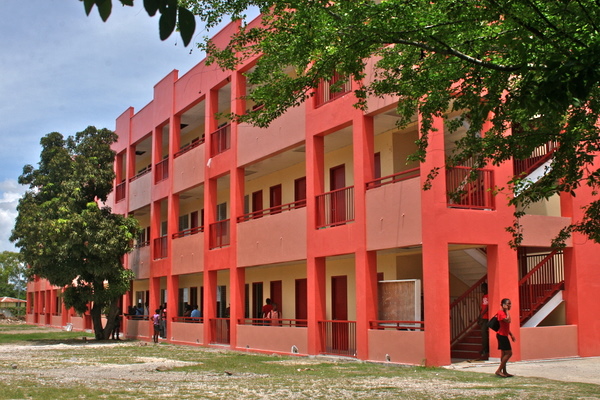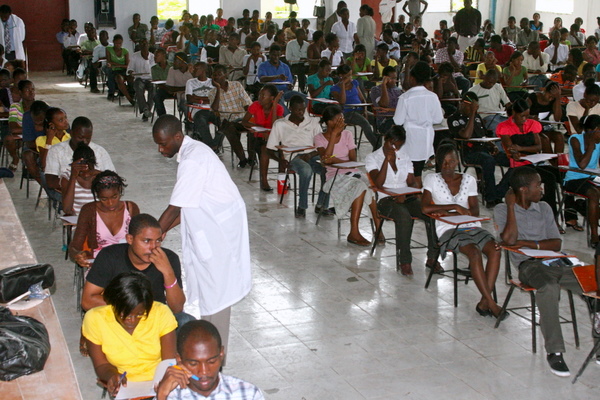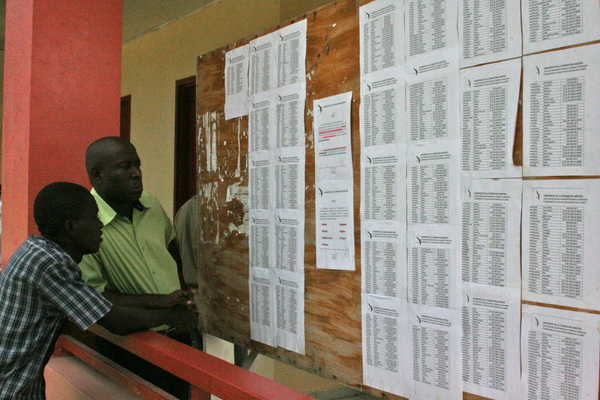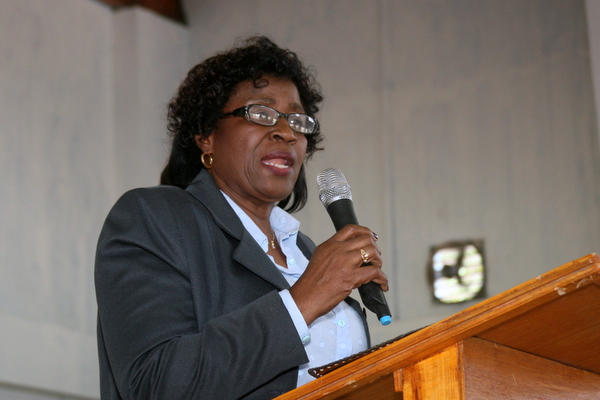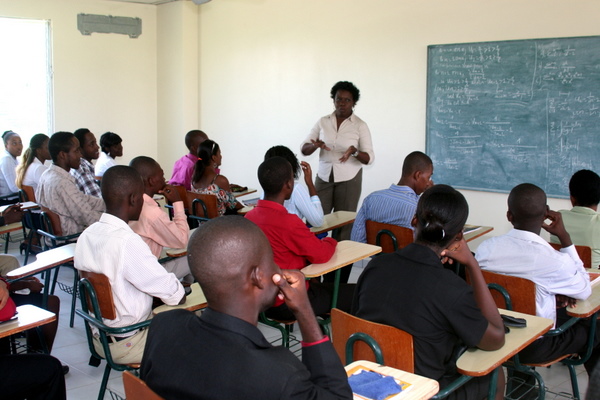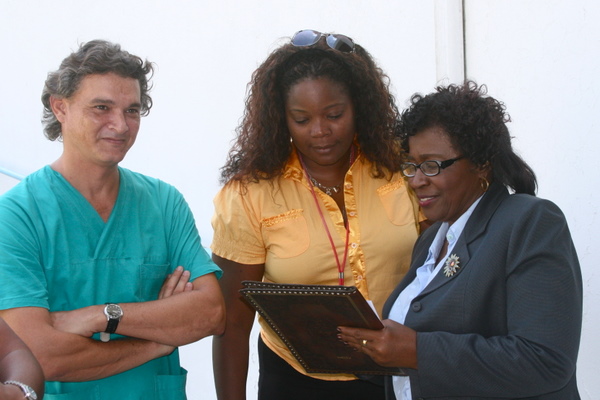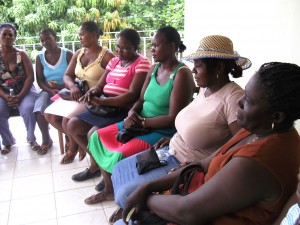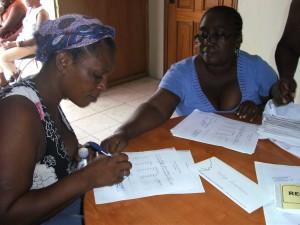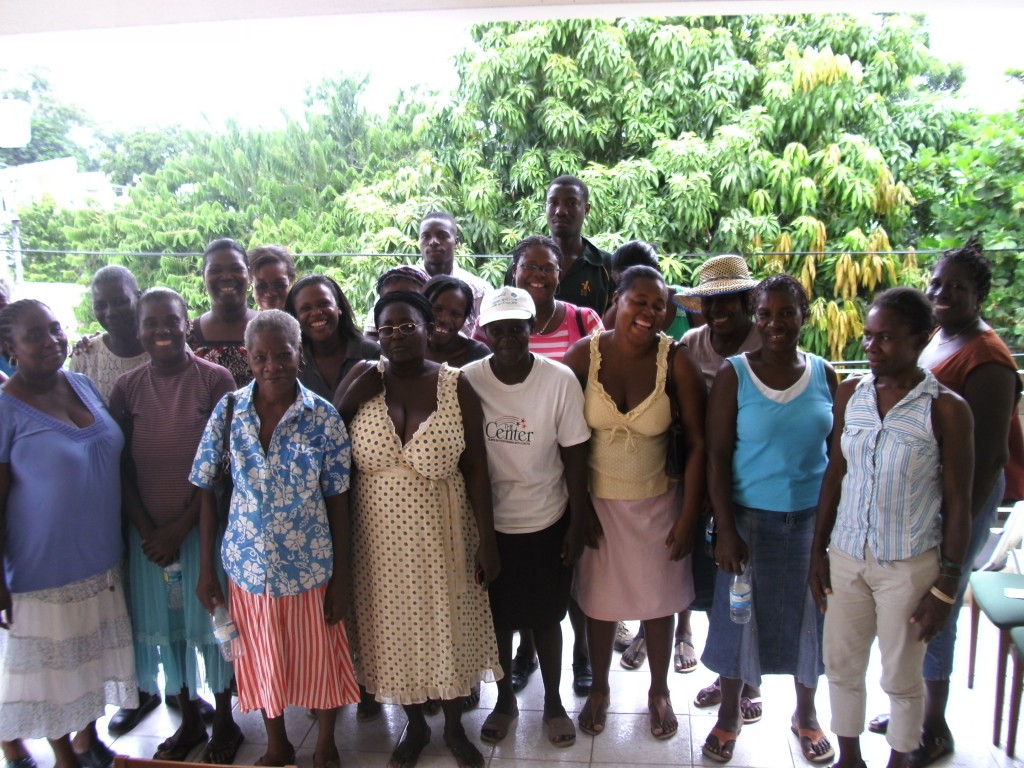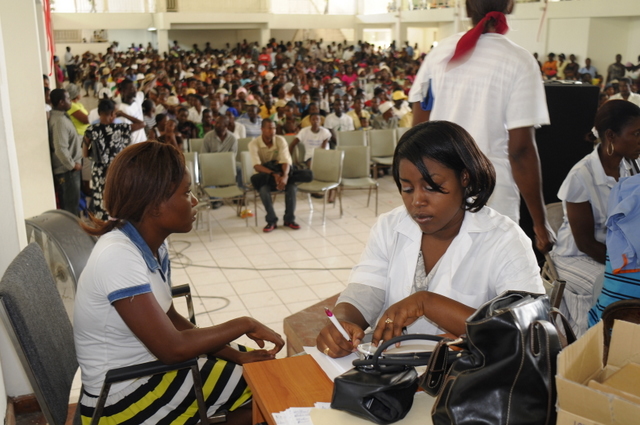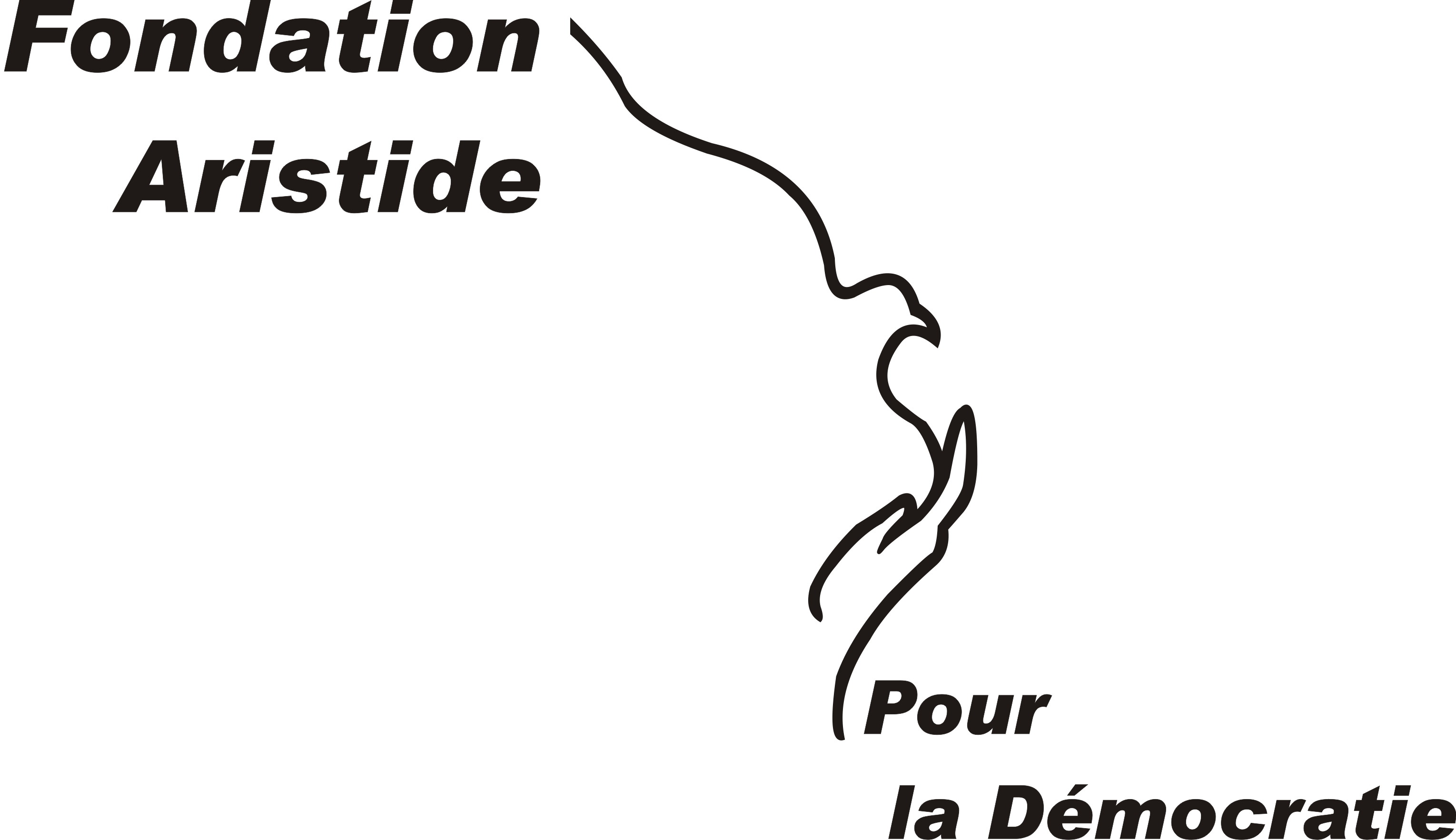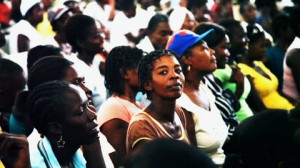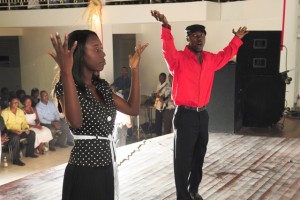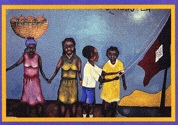UNIFA MEDICAL SCHOOL REOPENS
On September 26, 2011 the Medical School of UNIFA (the University of the Aristide Foundation) officially reopened its doors to a new class of future Haitian doctors. Seven years after the school’s forced closure in 2004, and four months after the return of former President Jean-Bertrand Aristide to Haiti, medical education resumed at UNIFA.
Over the summer of 2011, the Faculty of Medicine (pictured below) was repaired and refurbished after sustaining mild damage in the 2010 quake.
In late August, recruitment of students began. A week-long registration period brought thousands of young applicants to UNIFA and the Aristide Foundation where initial registration was held. Nine hundred students whose grades and scores on the Baccalaureate exam met the minimum requirement went on to take an entrance exam.
From the 900 applicants, 126 students who received the highest test scores were selected.
UNIFA was founded in 2001 in response to the desperate need for more doctors and health professionals in Haiti. A fundamental part of its mission was and is to begin to break down long traditions of exclusion of the poor majority in Haiti from access to higher education. Even before the earthquake there were very few spots in medical schools in Haiti (private or public). Gaining entrance to Medical School was nearly impossible for students without connections or financial means. The earthquake destroyed or severely damaged 80% of the institutions of higher education, most are still struggling to resume full functioning. All of this made the reopening of UNIFA a priority. Today UNIFA still aims to combat social exclusion by recruiting students from families who have historically been unable to access higher education, from all ten departments of Haiti, and with a commitment to equal gender representation. Without financial support from the public sector, UNIFA can no longer offer Medical education free of charge. However tuition at UNIFA is just one-third of what private medical school in Haiti charge.
On September 26, 2011 Dr Ginette Lubin the new Dean of the Medical School welcomed the new students to the campus.
Classes began the next day. This fall the students completed a 3-month intensive Spanish language program. As was the case before 2004, UNIFA’s medical curriculum is based on the curriculum used in Cuba, which has trained thousands of doctors from Latin America. UniFA’s faculty today consist of a mix of Haitian and Cuban medical and languages specialists. A select group of UniFA alumni, doctors from the original three classes of medical students who went on to complete their medical studies in Cuba after the 2004 coup d’etat, are assisting in the classrooms. The long term goal is that some of these young doctors will go on to get pedagogical training and eventually become faculty members at UNIFA.
After completing the first phase of their language training the new class began the Medical portion of their studies in January 2012. They are expected to complete their studies in three to four years.
The reopening of UNIFA war financially possible due to two generous donations. We are deeply grateful to Dr. Paul Farmer and Partners in Health for their steadfast support. We are also grateful to the Haiti Emergency Relief Fund for the faith and dedication they have shown to the AFD and to UniFA.
We congratulate this first class of medical students for their success in gaining entry to UNIFA. We salute the sacrifices that they and their families are making to allow them to attend. We also salute the tremendous hard work of everyone involved, the staff and faculty of UNIFA, for coming together, rebuilding and reopening in such a short time.
Market Women – the Heart of the Nation
Marie José Paul, a recipient of a loan from the Aristide Foundation, in front of her business.
This past August sixty market women gathered at the Aristide Foundation for Democracy to plan and discuss the opening of a micro-lending initiative. The earthquake had a devastating impact on the small businesses of the woman gathered. Many had lost homes, businesses and/or inventory. Almost all were living in tents or other temporary housing and lacked the funds to restart any commerce to support their families.
Since its inception in 1996 the Foundation has worked closely with women in the informal sector, making loans, selling food at low prices, and helping them to build organizations to advocate on their behalf. This summer with assistance from Haiti Emergency Relief Fund the AFD launched a women’s micro-lending project with a small loan fund of $7,000. A first group of 20 women received further training in early September, after which loans were made on September 8, 2010. Each woman received a loan of 12,000 gourdes ($300US). Interest on the loans is 5% (bank interest rates are 20%-30%). The loans are for a five-month period, with early repayment allowing them to pay less interest. The project is directed by Gladys Delouis, a long-time organizer with the AFD, and overseen by Director Toussaint Hilaire.
The 20 women who received loans sell their goods at the markets of Croix-des-Bouquets, Croix-de-Missions, Croix Brossals (the main market in downtown Port-au-Prince), Tabarre and Cite Soleil. The small businesses they launched with the loans include: selling cooked food by the plate (manje kuit), selling raw food (manje kri), fried snacks (mange fritay) as well as selling charcoal (marchand charbon) and clothing (marchand vetman). A couple of the women in the group, who live in La Plaine and have access to land, borrowed money to plant quick growing food stuffs which they plan to harvest and sell. Of the 20 women who received loans, 17 are the sole providers for their families.
The markets where these women sell their goods are the commercial hubs of their communities. In these markets, and many others across Haiti, thousands and thousands of men and women work, and many more thousands of Haitians buy their daily necessities. Historically, the markets that serve Haiti’s poor majority were ad-hoc, unplanned, and dirty. While Aristide was President from 2000-2004 fifty-three public market places across the country were constructed or repaired—including all of the markets listed above, where the women in this project work. Clean and dignified stalls were created for vendors, roofs, drainage, and toilets were put in. Public literacy centers, and medical clinics were set up inside the markets for the benefit of both sellers and customers. Since the coup in 2004, most of these facilities have fallen into disrepair because the state does not bother to maintain them. Programs like the marketplace literacy centers and health centers were abruptly abandoned—facts well know in on the ground in Haiti, if virtually ignored internationally.
Since September, the 20 women in the micro-lending project have been meeting at the Foundation every 15 days, to check in, share ideas and continue to shape the program.
AFD Clinincs Treat Over 1,000 People Each Week
Every Wednesday morning in the auditorium of the Aristide Foundation for Democracy in Tabarre, Haiti, over a 1000 people receive free primary care treatment. Almost all of the people coming to the Foundation for care are living in temporary settlements in the area.
The clinics have become a weekly gwo konbit medical – with 40 or more doctors, dozens of volunteers and health workers and pharmacists, working together to make sure that everyone who comes sees a doctor and receives the medicine they need.
Services offered include: general medical care, as well as pediatric, eye, dental, gynecological, orthopedic and psychological care. The Haitian Ministry of Health (MSPP) sends health monitors to carry out vaccinations for all those who want them. Canned milk is distributed to all pregnant women and mothers of young children.
The most commonly observed health problems are malnutrition, diarrhea in children, respiratory ailments, urinary tract infections, intestinal parasites, and untreated high blood pressure. The vast majority of those attending the clinics are living in temporary settlements (tent cities) across the metropolitan area. Many of the health problems they face are a direct result of the conditions in the camps, which have little or no sanitation and limited water. And it is now raining nearly every night.
